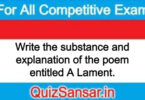
Give a brief life-sketch of Richard Wright.
Give a brief life-sketch of Richard Wright.
Ans.
Richard Nathaniel Wright was born on September 4, 1908 at Plantation, Roxie, Mississippi. He lived with his maternal grandmother in Jackson, Mississippi from early 1920 until late 1925. Here he felt stifled by his aunt and grandmother, who tried to force him to pray that he might find God. He later threatened to leave home because Grandmother Wilson refused to permit him to work on Saturdays, the Adventist Sabbath. Early strife with his aunt and grandmother left him with a permanent, uncompromising hostility towards religious solutions to everyday problems.
In 1923, Wright excelled in grade school and was made class Valedictorian of Smith Robertson junior high school. In September that year, Wright registered for mathematics, English, and history courses at the new Lanier High School in Jackson, but had to stop attending classes after a few weeks of irregular attendance because he needed to earn money for family expenses. His childhood in Memphis and Mississippi shaped his lasting impressions of American racism. At the age of sixteen years, Wright published his first story. The Voodoo of Hell’s Half-Acre. It was published in the Southern Register, a local black newspaper.
By 1935, Wright had completed his first novel. Cesspool, published as Lawd Today (1963), and in January, 1936 his story Big Boy Leaves Home was accepted for publication in New Caravan. Wright gained national attention for the collection of four short stories entitled Uncle Tom’s Children (1938). By May 6, 1938, excellent sales had provided Wright with enough money to move to Harlem, where he began writing the novel Native Son (1940).
In January, 1941 Wright received the prestigious Spingarn Medal for noteworthy achievement by a black. Wright’s semi-autobiographical Black Boy (1945) described his early life from Roxie through his move to Chicago, his clashes with his seventh-day adventist family, his troubles with white employers and social isolation. American Hunger, published posthumously in 1977, was originally intended as the second volume of Black Boy.
Wright moved to Paris in 1946, and became a permanent American expatriate. In Paris, he became friends with Jean-Paul Sartre and Albert Camus. His Existentialist phase was depicted in his second novel, The Outsider (1953), which described an African-American character’s involvement with the Communist Party in New York. After becoming a French citizen in 1947, Wright continued to travel through Europe, Asia, and Africa. These experiences were the basis of numerous nonfiction works. In 1949, Wright contributed to the anti-communist anthology The God That Failed. Wright’s book on his journey, Black Power, was published in 1954.
In 1955, Wright visited Indonesia for the Bandung Conference. He recorded his observations on the conference as well as on Indonesian cultural conditions in The Colour Curtain: A Report on the Bandung Conference. Other works by Richard Wright included White Man, Listen! (1957); a novel the Long Dream in 1958; as well as a collection of short stories, Eight Men, published in 1961, shortly after his death.
A collection of Wright’s travel writings was published by the Mississippi University Press in 2001. At his death, Wright left an unfinished book, A Father’s Law. It deals with a black policeman and the son he suspects of murder. Wright’s daughter Julia Wright published A Father’s Law in January, 2008. An omnibus edition containing Wright’s political works was published under the title Three Books from Exile: Black Power: The Colour Curtain; and White Man, Listen!
Wright’s Principal Works
Drama: Native Son
Fiction: Uncle Tom’s Children (1938). The Man Who Was Almost A Man (1939), Native Son (1940), The Outsider (1953), Savage Holiday (1954), The Long Dream (1958), Eight Men (1961), Lawd Today (1963), Rite of Passage (1944), A Father’s Law (2008).
Non-fiction: Black Boy (1945), Black Power (1954), The Colour Curtain (1956), Pagan Spain (1957). American Hunger (1977), Black Power: Three Books from Exile: ‘Black Power’: ‘The Colour Curtain”; and ‘White Man, Listen!” (2008).
Essays: The Ethics of Living Jim Crow: An Autobiographical Sketch (1937). Introduction to Black Metropolis: A Study of Negro Life in a Northern City (1945), I Choose Exile (1951), White Man, Listen! (1957). Blue Print for Negro Literature (1937), The God that Failed (1949).
Poetry : Haiku: This Other World (1998), Re-issue: Haiku: The Last Poetry of Richard Wright (2012).
-
Write the critical appreciation of the poem No. 12 entitled Far Below Flowed.
-
Write the critical appreciation of the poem No. 11 entitled Leave this Chanting.






